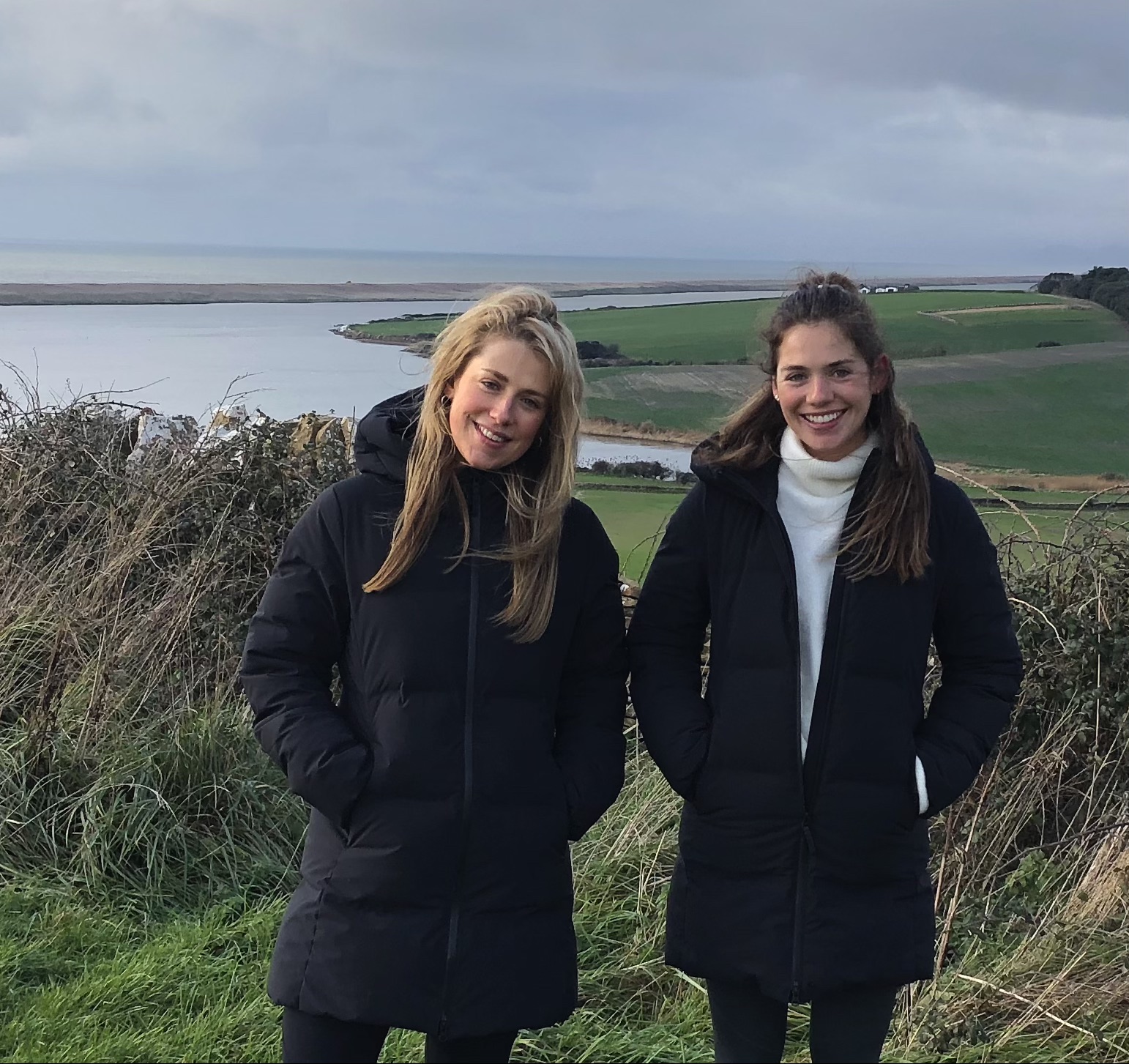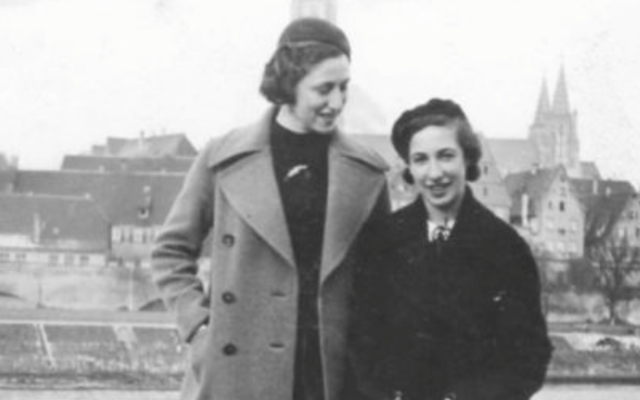OPINION: My great aunt’s story is a powerful testimony in the face of nationalism and terror
Images of Ukrainian women and children carrying possessions in prams, waiting for trains to take them to safety, stir the collective memory of the Jewish community.
My sister, Imogen, was asked by her company to give a speech for Holocaust Memorial Day. Imogen decided to do some research on our family. My paternal grandfather was Jewish and came to England from Germany shortly after Kristallnacht. I never met my grandfather and I know little about our family history – beyond the fact that 30 of my relatives died in the Holocaust.
Whilst undertaking her research my sister found a documentary from a woman called Ann Dorzback (originally Annalisa Wallersteiner), my great aunt. I knew nothing about her – other than that my sister has one of her mother’s handbags. In this documentary she tells her remarkable story of leaving Nazi Germany through a child’s eyes and walks through photo albums of our family in the 1930s. What struck me is how ordinary their lives were before the Nazis came to power and the step by step escalation of antisemitic legislation before 1939 which led to a relatively assimilated family to be treated as outsiders, aliens and enemies of the racial state.
If we can learn anything from the 1930s, it is that things can quickly fall apart.”
Ann is a German-born American citizen. She is 101, but looks far younger. She and her only sibling, Charlotte, were born to Leopold and Elsa Wallersteiner, in Ulm, where their parents owned a textile factory.
Ann said she was 12 years old when some of her school friends began to sign up to the Hitler Youth movement — the Nazi youth movement led by Baldur von Schirach. Hitler regaled his motley band of followers with deranged assertions: “Jews are a people of robbers who have never founded any civilisation…everything he has is stolen…it is foreigners who create and work for him, it is foreigners who shed their blood for him” (speech in Munich, 1922).
Unfortunately, tropes which equate Jews with the plutocracy of global finance, owing allegiance to international Jewry, degrading and exploiting labour, corrupting culture and attempting world domination, are still never more than a few clicks away on Facebook and Twitter and attract the support of extremists on the left and right.
I cannot imagine the anguish Ann must have experienced as a child seeing the dangerous societal trajectory of hate against Jews. Fortunately, she was able to flee to England and then America before emigration from Nazi Germany became impossible.
Unfortunately, tropes which equate Jews with the plutocracy of global finance, owing allegiance to international Jewry, degrading and exploiting labour, corrupting culture and attempting world domination, are still never more than a few clicks away on Facebook and Twitter.
My German/Jewish relatives were always an unknown quantity. Just names. It has always pained my father to talk about them. And all of a sudden, they are real people with experiences that echo so much of what we are seeing today. Ann’s story immediately reminded me of the Ukrainian refugees currently fleeing everything they love and know because of Putin’s illegal and savage invasion.

Safely in America during the war, Ann learned what had happened to her former Jewish classmates, friends and family who had stayed in Germany. I was astounded to discover that Ann knew Sophie Scholl, and her brother, Hans. Hans and Sophie, while studying at the University of Munich, created a resistance group called The White Rose.
They produced and distributed anti-Nazi leaflets. While they were distributing leaflets at the university on February 8 1943, a university staff member saw them and informed the Gestapo. On February 22, the Nazis guillotined Hans and Sophie for treason. Hans’ last words were “long live freedom.”
My German/Jewish relatives were always an unknown quantity. Just names.
In recent years, Ann has re-visited the family home in Ulm where she grew up. In the 1980s, her father’s factory turned into a school called St. Hildegard.
Ann recognises that Germany has gone to great lengths to atone for the atrocities which took place. This guilt and contrition constitutes the cornerstone of Germany’s approach to collective national memory today.
If we can learn anything from the 1930s, it is that things can quickly fall apart. Democracies find it difficult to deal with authoritarianism and nations which do not respect the rule of law. As World War II showed, in the long run, democracies often prevail – but the cost of victory is always high and requires constant determination and the sacrifice of many innocent lives.
The plight of the Ukrainian people is redolent of the suffering and oppression which befell the victims of totalitarianism in the middle of the twentieth century and we cannot afford to look away and hope that Putin’s version of aggressive nationalism will resolve itself without a collective effort by the international community.
In times like these, the power of testimony cannot be overstated. First-person narratives are becoming increasingly hard to find.
The images of Ukrainian women and children carrying their possessions in prams, waiting for trains to take them to safety, against a backdrop of bombed out buildings and charred remains of human beings, stir the collective memory of the Jewish community. To show solidarity and support for the victims of Putin’s war, I have decided to run a marathon in aid of Ukrainian refugee children. At work I have been assisting British sponsor families with visas for Ukrainian refugees. Britain must heed the lessons of history and let in as many Ukrainian refugees who are able to make the journey.
In times like these, the power of testimony cannot be overstated. First-person narratives are becoming increasingly hard to find. But nothing sticks like storytelling, especially when the testimony comes from someone who has witnessed and experienced those horrors first-hand. With a sense of renewed urgency my sister and I are planning a trip to America to visit Annalisa in person.
My great aunt’s story exposes the full range of human responses in the face of aggressive nationalism and terror. We all must decide to either partake in the repression and hatred or to stay humane even in an inhumane environment.
The Holocaust still raises fundamental questions that are relevant today: about the impulses and tensions that cause people to act as they do – or not to act at all.

Thank you for helping to make Jewish News the leading source of news and opinion for the UK Jewish community. Today we're asking for your invaluable help to continue putting our community first in everything we do.
For as little as £5 a month you can help sustain the vital work we do in celebrating and standing up for Jewish life in Britain.
Jewish News holds our community together and keeps us connected. Like a synagogue, it’s where people turn to feel part of something bigger. It also proudly shows the rest of Britain the vibrancy and rich culture of modern Jewish life.
You can make a quick and easy one-off or monthly contribution of £5, £10, £20 or any other sum you’re comfortable with.
100% of your donation will help us continue celebrating our community, in all its dynamic diversity...
Engaging
Being a community platform means so much more than producing a newspaper and website. One of our proudest roles is media partnering with our invaluable charities to amplify the outstanding work they do to help us all.
Celebrating
There’s no shortage of oys in the world but Jewish News takes every opportunity to celebrate the joys too, through projects like Night of Heroes, 40 Under 40 and other compelling countdowns that make the community kvell with pride.
Pioneering
In the first collaboration between media outlets from different faiths, Jewish News worked with British Muslim TV and Church Times to produce a list of young activists leading the way on interfaith understanding.
Campaigning
Royal Mail issued a stamp honouring Holocaust hero Sir Nicholas Winton after a Jewish News campaign attracted more than 100,000 backers. Jewish Newsalso produces special editions of the paper highlighting pressing issues including mental health and Holocaust remembrance.
Easy access
In an age when news is readily accessible, Jewish News provides high-quality content free online and offline, removing any financial barriers to connecting people.
Voice of our community to wider society
The Jewish News team regularly appears on TV, radio and on the pages of the national press to comment on stories about the Jewish community. Easy access to the paper on the streets of London also means Jewish News provides an invaluable window into the community for the country at large.
We hope you agree all this is worth preserving.






















